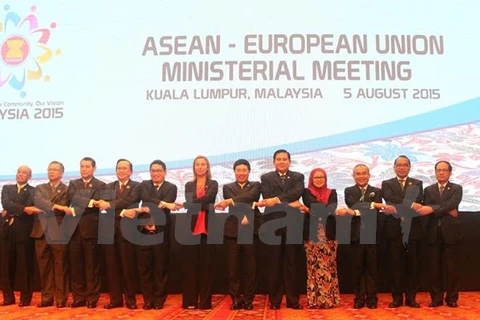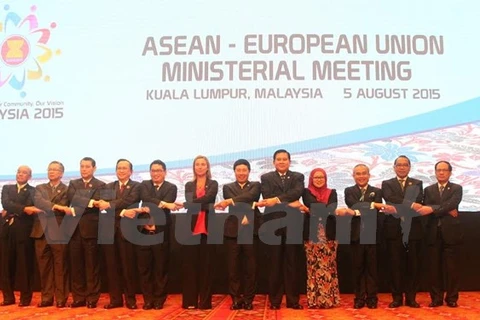 Deputy Prime Minister and Foreign Minister Pham Binh Minh at the Lower Mekong-US Ministerial Meeting (Source: VNA)
Deputy Prime Minister and Foreign Minister Pham Binh Minh at the Lower Mekong-US Ministerial Meeting (Source: VNA) Deputy Prime Minister and Foreign Minister Pham Binh Minh underscored the importance of quality infrastructure and balance between economic growth and environment protection in his speech to the eighth Mekong-Japan Foreign Ministers’ Meeting in Kuala Lumpur, Malaysia on August 5.
He proposed the Mekong – Japan cooperation focus on the building of a feasibility study for a multi-mode transport route connecting the East-West Economic Corridor (EWEC) and the Southern Economic Corridor (SEC) with South Asia region. He called for increased coordination with the Mekong River Commission on assessing environmental impact caused by infrastructure projects, responding to natural disasters and climate change. Mekong countries and Japan should also work together to continue improving business climate and attracting investment in high added-value areas such as agriculture and tourism.
The meeting adopted the Mekong – Japan Action Plan to realise the Tokyo Strategy 2015 that covers specific projects across four pillars, including industrial infrastructure development in the Mekong region; increased hard connectivity between Mekong Sub-region and its vicinities; development of industries and value chains, human resources, regulatory and economic connectivity and people-to-people exchange; sustainable development towards a green Mekong with quality growth, and intensified Mekong-Japan cooperation with regional cooperative mechanisms.
The plan lists projects which are or will be implemented in the time ahead to make good use of the financial resources committed by Japanese Prime Minister Shinzo Abe at the 7th Mekong-Japan Summit. PM Abe committed 750 billion JPY in official development assistance to Mekong countries to materialise Tokyo Strategy 2015 and pledged priority to a 110 billion USD infrastructure initiative conducted between the Greater Mekong Sub-region and the Asian Development Bank.
Ministers also talked regional and international issues of shared concern, including the East Sea issue and Korean peninsula.
They agreed that the ninth meeting of this kind will take place in Laos next year, on the sidelines of the 49 th ASEAN Foreign Ministers’ Meeting.
The same day, Deputy PM Minh and Republic of Korea (RoK)’s Minister of Foreign Affairs Yun Byung-se co-chaired the fifth Mekong – RoK Foreign Ministers’ meeting.
In his speech, Minh stressed the significance of increased connectivity through hard and soft infrastructure in the sub-region, especially transport and logistics infrastructure on the EWEC and SEC.
He called for continued collaboration in the management and sustainable use of water resources and other resources in the Mekong River, development of agriculture, rural areas and markets for farm produce made by Cambodia, Laos, Myanmar and Vietnam.
He highly valued the role of private sector and suggesting making good use of effective and practical mechanisms like the Mekong – RoK Business Forum.
Participants hailed the positive progresses of the 2014-2017 Action Plan and the outcomes of the third Mekong-RoK business forum in Cambodia in June.
They welcomed the RoK’s decision to raise funding to the Mekong-RoK fund to 1 million USD in 2015.
Participants also shared views about the developments in Korean peninsula, the East Sea, climate change, disaster response, anti-terrorism and trans-national crime, ensuring water, energy and food security.
The sixth Mekong – RoK Foreign Ministers’ Meeting is slated for 2016 in Laos on the fringes of the 49 th Foreign Ministers’ Meeting.-VNA























